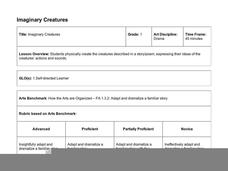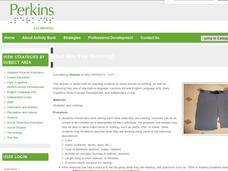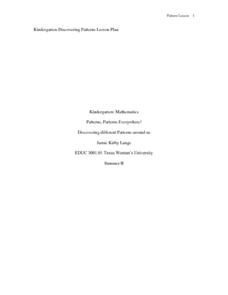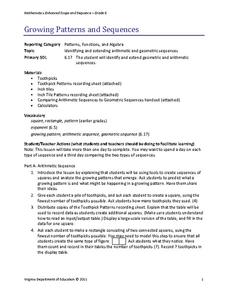Curated OER
Predicting a Mystery's Solution
Practice making informed predictions. Have your class create a paper fortune-teller and ask questions about the future. They compare the fortune-telling process to the more informed kind of predictions they make while reading. They...
Benjamin Franklin Tercentenary
Many Bens: Character Revealed in Writing
Benjamin Franklin may be known as a Founding Father, but he was also a prolific writer. Scholars examine his better-known pieces to learn about genre, voice, and early American history. The resource includes options for various...
Council for Economic Education
Specialization and the Decathlon
Michael Phelps, the economist? Scholars research the economic advantages of specializing in one kind of service, and how it relates to athletes doing the same in their respective sports. They evaluate absolute advantage, production, and...
National Wildlife Federation
The Wheel of Trouble
What kind of troubles affect turtles? Learners create paper plate wheels to show four different hazards to sea turtles. Pupils color four segments of a picture to represent the overharvesting, changing beaches, pollution, and fishing...
Curated OER
Evaluating Information on Food Labels
What kinds of foods include corn? Corn syrup? Start by viewing a clip of Food Inc. with your middle or high schoolers. Then, study a list of corn-derived ingredients, encouraging your class to see how many food products contain corn. A...
Curated OER
Introduce Vocabulary: Animal Tracks (Dorros)
What kind of animal made those tracks? Explore some wild vocabulary in context as learners listen to Arthur Dorros' book, Animal Tracks. Before your read this, introduce the new words like bother, dam, reed,...
Southern Nevada Regional Professional Development Program
Focus: The Paideia Seminar
Compelling discussions are the result of open-ended, challenging questions. An introduction to Paideia discussions includes explicit directions about how to prepare readers and how to model the kinds of questions they should develop...
Curated OER
Food and Energy
How many calories are needed each day? What foods have good calories? What happens to calories that don't get used? How many calories are in the different kinds of foods and drinks? How many calories do I need to do a certain activity?...
Curated OER
Your Energy Out
How much activity is appropriate for elementary school youngsters? What kind of activities do they need to do? Check out the Physical Activity Guidelines for Americans. Look to see what are age-appropriate activities for each grade...
American Statistical Association
Candy Judging
Determine the class favorite. The statistics lesson plan has pupils collect, display, and analyze data. Pairs rank four kinds of candy based on their individual preferences. Working as an entire class, learners determine a way to display...
Alabama Department of Archives and History
Nellie Bly to Dr. Peter Bryce: 19th Century Asylum Reform
What kind of treatment could a patient expect in an asylum during the 1800's? The abusive and neglectful conditions in 19th century asylums are the focus of a lesson that examines the work of reformers Nellie Bly, Dorothea Dix, and...
Gwinnett County Public Schools
Analysis of the Tuck Everlasting and The Birchbark House Text Exemplars
Looking to introduce some text-based questions into your ELA lessons? Practice the kinds of skills the Common Core demands with the seven text-based questions and the essay prompt provided here. Designed to be a three-day lesson, day one...
Mr Gym
Tunnel Tag
Tunnel tag requires players to form some kind of tunnel when they are tagged. In order to become unfrozen from being tagged, another player has to go through the tunnel they formed. There are several examples of tunnels that a player can...
Hawaiʻi State Department of Education
Imaginary Creatures
Drama and movement are wonderful ways to cover story elements such as setting, character, and descriptive writing. Little ones listen to a poem about imaginary creatures. As they listen, they shape their bodies into what they think the...
Curated OER
Informative/ Expository Writing
Elementary schoolers are charged with writing an article for their peers. A class discussion yields topics about which learners consider themselves to be an expert. The teacher models how to construct an article by using facts he or she...
Perkins School for the Blind
Learning Names of Articles of Clothing
What to wear today; such a vexing question. Spend some time introducing the names, fabrics, types, colors, and functions of various articles of clothing to your class. Each child will take turns asking each other what they are wearing....
Center Science Education
Field Projects: Science in Action
Cooperative groups select from one of four scenarios regarding hurricanes, greenhouse gases, thunderstorms, or the global climate domino effect. They discuss what kind of research needs to be conducted to address their chosen scenario...
EngageNY
Using Informational Text Features and Learning Freaky Frog Vocabulary
What kind of text features help children build a strong vocabulary? Class members use text features such as headers to unpack new vocabulary words. They create vocabulary journals in which they will write what they think the definition...
Curated OER
Picture This
Give your littlest learners the opportunity to learn how to discuss, observe, and visualize. First, they determine if the image they are looking at is a photograph or a painting. Then they work together to brainstorm words that describe...
Perkins School for the Blind
Mix and Match
Sorting and matching are skills that have all kinds of applications. Learners with low, but useable vision work to match an object to an object, an object to a picture, and a picture to a picture. This will help them identify objects...
Newseum
Are You a Publisher?: Free Press and You
What kinds of media do your pupils use to read and publish information? After a discussion about what publishing means, and about the freedom of the press, class members interview one or two other people about their publishing habits....
Sea World
Penguins
Everyone loves penguins! Learn about the flightless birds of the Antarctic with a series of lessons and activities. From the differences between the 17 species of penguins to the best way to remove oil from a penguin's features,...
Texas Woman’s University
Patterns, Patterns Everywhere!
Not only is pattern recognition an essential skill for young children to develop, it's also a lot of fun to teach! Over the course of this lesson, class members participate in shared readings, perform small group...
Virginia Department of Education
Growing Patterns and Sequences
Learners explore, discover, compare, and contrast arithmetic and geometric sequences in this collaborative, hands-on activity. They build and analyze growing patterns to distinguish which kind of sequence is represented by a set of data...
Other popular searches
- Random Acts of Kindness
- Acts of Kindness
- Caring and Kindness
- Kindness Game
- Kindness Week
- Kindness E Mail
- Lesson Plans Kindness
- Kindness to Animals
- Kindness Crafts
- Randon Acts of Kindness
- Guidance: Kindness
- Kindness. Integrity

























